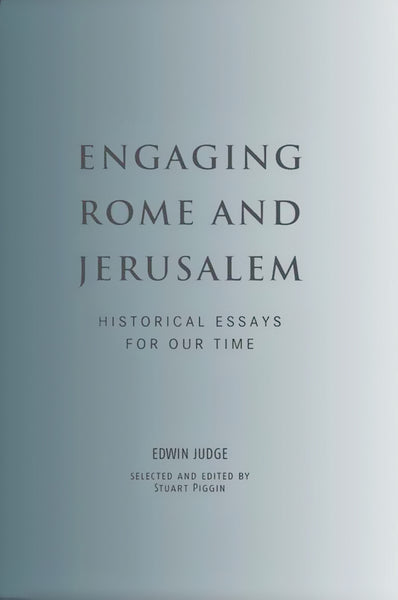Book Review: Engaging Rome & Jerusalem

Edwin Judge, Engaging Rome and Jerusalem: Historical Essays for our Time (ed. Stuart Piggin; Australian Scholarly, 2014).
E.A. Judge is Emeritus Professor of History at Macquarie University and is a well-known Australian historian of Christianity in the Roman world. Several collections of his essays have appeared in prior volumes including Social Distinctives of the Christians in the First Century: Pivotal Essays (ed. David Scholer; Hendrickson, 2008); The First Christians in the Roman World, Augustan and New Testament Essays (ed. James R. Harrison; WUNT 1.229; Mohr Siebeck, 2008); Jerusalem and Athens: Cultural Transformation in Late Antiquity (ed. Alanna Nobbs; WUNT 1.2654; Mohr Siebeck, 2010). Testimony to Judge’s stature is the interaction that his work has recently received from no less than N.T. Wright in his mammoth Paul and the Faithfulness of God. This volume, Engaging Rome and Jerusalem, helpfully compiled by Stuart Piggin, provides a collection of shorter essays, addresses, interviews, and book reviews to bring the existing Judgian corpus to completion.
Part One, ‘Tracing the Imprint of Rome’, engages several debates about the Roman empire, including the extent of book culture and the meaning of the imperatorship of Augustus. Part Two is labelled ‘The Peculiar Influence of Jerusalem’ and pertains largely to the nature of ‘religion’ in the ancient world and whether Christianity was in fact an ancient religion. Part Three is about the historical Jesus, with four short studies about Jesus as a historical figure. Part Four—‘Where is the Truth in the New Testament’—largely addresses the truth of the theology and history of the New Testament with a particular focus on the Acts of the Apostles. Part Five discusses ‘The State and the Church’, with short remarks on Christ and Caesar, as well as Democracy. The next two sections provide some cultural commentary on Christianity and contemporary society by discussing ‘Valued: Living in Two Cities at Once’, which is particularly concerned with how to be a Christian in a non-Christian world. Gender issues are also tackled in ‘There is Neither Male nor Female’, which showcases several of Judge’s studies expounding the essentially egalitarian perspectives of Paul in the New Testament. Parts Eight and Nine pertain to the role of faith in education in ‘Education versus Schooling’, and ‘The University: Does Theology fit?’—where Judge rejects the idea of a Christian university and makes an exhortation to Christian colleges. The final part, ‘Where is the Truth in History?’ is largely a series of reviews, lectures, and interviews about history.
The book gives the impression of being a collection of ‘off-cuts’ from previous volumes of Judge’s writings, or comprising a type of miscellaneous assortment of Edwin Judge’s thoughts in the diverse genres of book reviews, lectures, interviews, and short notes. Some are, in fact, incomplete—such as § 10.2 on ancient history. Piggin’s introductions to every chapter provide some much needed context and clarity, and show the significance of each piece relative to its time. In regard to Judge’s reputation as a social historian of the early church, I would not call this the epitome of his work, but it does provide a published location for his minor notes and reviews. Still, there are some useful studies here, like ‘Was Christianity a Religion?’(§2.6), ‘Paul’s Women’ (§7.2), and ‘What is expected of a Christian College?’ (§9.3), which I personally found very helpful and stimulating.

Leave a comment
Comments will be approved before showing up.



